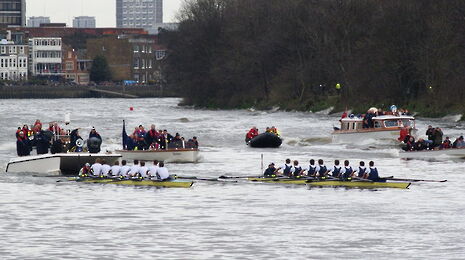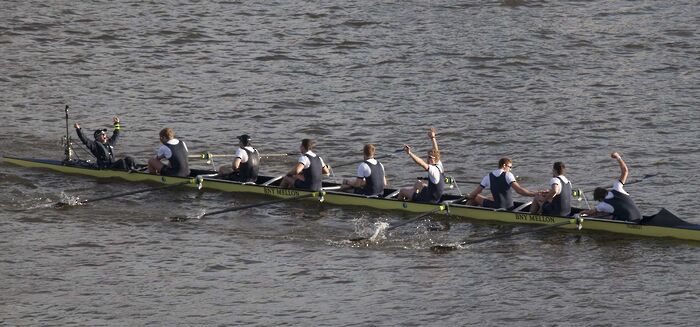Broadcasting the Boat Race is a waste of license-payers’ money
William Ross argues that the BBC’s screening of the Boat Race is out of touch and must come to an end

When, in March 2009, the BBC won back the rights to televise the Oxford and Cambridge Boat Race, the event was described as an “epic sporting contest” which they were “delighted” to screen. It is fair to say, however, that a great deal of the response to this news was far from positive: “Yippee, the boat race is back on the BBC,” vented one angry commenter. “Virtually nothing of interest comes out of BBC Sport these days, but at least they’re raiding the licence fee to broadcast a bunch of toffs in boats”.
Another lamented the Boat Race as the “ultimate symbol of the bubble that Oxford and Cambridge live in while the rest of the world has moved on to the 21st century”. Another put it more succinctly: “How very dull... what a non-event”.
All this begs the obvious question: is the BBC right to spend the hard-earned money of licence-payers on the Boat Race?
On the face of it, it is utterly bizarre that the BBC should choose to spend licence-payers’ money on a University sporting event between two University crews. What’s more, when it comes to the men’s crews, these are by no means even the strongest crews on the University rowing circuit: in their only official fixtures against University opposition in the build-up to the Boat Race, the Oxford and Cambridge men’s crews were both beaten by Oxford Brookes (admittedly widely regarded as one of strongest University crews in the country), for example.
Cambridge and Oxford do also send crews to the BUCS rowing regatta, though their performance at the regatta does little to support the idea that the Oxbridge crews are the best in the country. Indeed, Cambridge came in seventh in the 2018 Victor Ludorum trophy, while Oxford finished eleventh.
This is not a meritocracy where the sport’s strongest University crews go head to head live on national television, but a cup final where the same two teams reach the final each year.
“This is not elite sport at the very highest level that on its merits demands to be broadcast live on television”
Of course, the Oxbridge crews work enormously hard combining a demanding training schedule with their studies, and their enormous dedication and commitment should not be dismissed. Nevertheless, this is not elite sport at the very highest level which, based on its merits alone, demands to be broadcast live on television. Indeed, the Cambridge crew this year includes a 46-year-old retired Olympian and one of this country’s greatest ever athletes. But he is also a man who is closer to the national retirement age than he is to the age of the average undergraduate student – it would not be illogical to suppose that his time in the race is not representative of university sport.
In light of the backlash unleashed by the BBC’s announcement that they had won back the television rights, Roger Mosey, BBC Director at the time and currently master of Selwyn College, put forward an explanation:
“I knew this would provoke a somewhat varied response but the basic point is this. If it were the elitist, irrelevant event that some people claim, nobody would watch it. In fact, it’s watched by huge numbers of viewers – most of whom have no connection with Oxford or Cambridge but simply enjoy the event and the competition. It would be odd for the BBC to refuse to cover what so many millions see as a national event.”
And sure, on the face of it, the Boat Race is (astonishingly) one of the BBC’s most highly-viewed sporting events, with the women’s 2016 race attracting 4.8 million viewers and the men’s 2016 race attracting 6.2 million. However, given the BBC’s special talent for losing the television and radio rights for high-quality sporting events (from Test match cricket to Formula One to the Ryder Cup), the fact that the Boat Race is one of the BBC’s most highly viewed sporting events is perhaps not quite as impressive a feat as it first appears.
Indeed, compared to other high-calibre sporting events, the Boat Race’s viewing figures pale in comparison: 44.5 million tuned to the BBC’s coverage of the World Cup final; over 20 million watched Usain Bolt win the 100 metre Olympic race; 17.3 million enjoyed Andy Murray’s Wimbledon final win over Novak Djokovic. Put simply, the Boat Race is not by any stretch of the imagination one of the country’s most popular sporting events and certainly not popular enough to enjoy such a privileged position on the BBC’s sporting calendar ahead of events the Ashes and the Rugby World Cup final. The Boat Race coverage would be fine as a novelty event in a packed BBC sports schedule, but not as one of the BBC’s main sports features.
The Boat Race does not have a wide enough following to deserve to be screened on national television. But, the BBC is not a private corporation in search of profit and needing to pander to market forces, but a public service broadcaster operating under Royal Charter to promote the public interest. One argument for the BBC’s decision to screen the event, then, would be that they are promoting the wider beneficial effects of rowing as an activity followed by and popular among the wider population.
“The 2018 Oxford and Cambridge men’s eights contained three times as many Old Etonians as students who had gone through the British state education system”
But rowing, by necessity, is a sport which a large portion of the population is unable to take part in. Unless you go to a public school with access to the river or Oxbridge, where rowing is so heavily subsidised – often at the expense of other sports – that many can take part in college rowing free of charge, rowing is enormously expensive, requiring access to a river and hugely expensive equipment. Without access to these things and the ability to pay for them, you simply can’t take part in the sport.
Participation among the wider public, therefore, is predictably very low: according to the Active Sport Survey, only 71,300 over 16 year-olds participated in rowing at least once a week between April 2015 and March 2016, compared with 2,497,800 swimmers, 2,016,300 cyclists and 1,851,500 footballers. Rowing participation rates even came behind bowls, angling and mountaineering.
Put these things together and it’s no surprise that participation in the Boat Race tends to be a specialised, public school-dominated pursuit. In spite of Mosey’s oddly sweeping assertion that the Boat Race is not “elitist”, the Oxford and Cambridge men’s eights at the 2018 Boat Race contained three times as many Old Etonians as students who had gone through the British state education system, while members of this year’s men’s Oxford and Cambridge crews again hail from some of country’s most exclusive schools: Eton (x3), Winchester College, Westminster School, and St Paul’s. If the BBC is then, in fact, promoting this sport, to whom exactly are they promoting it? And is this really a socially and finally inclusive sport worthy of promotion by the BBC?
It’s time for the BBC to stop wasting license payer money on televising the Boat Race.
- Correction, 7th April at 10.13am: This article was amended to correct the false claim that Cambridge and Oxford do not take part in the BUCS Rowing Championships.
- Amendment, 9th April at 3pm: This article was amended to give more context highlighting the strength of the Oxford Brookes rowing team, as well as performance in the 2018 BUCS Regatta
 News / Colleges charge different rents for the same Castle Street accommodation2 March 2026
News / Colleges charge different rents for the same Castle Street accommodation2 March 2026 News / News in Brief: waterworks, wine woes, and workplace wins 1 March 2026
News / News in Brief: waterworks, wine woes, and workplace wins 1 March 2026 News / Angela Merkel among Cambridge honorary degree nominees27 February 2026
News / Angela Merkel among Cambridge honorary degree nominees27 February 2026 News / Climate activists protest for ‘ethical careers policy’1 March 2026
News / Climate activists protest for ‘ethical careers policy’1 March 2026 News / King’s hosts open iftar for Ramadan3 March 2026
News / King’s hosts open iftar for Ramadan3 March 2026









